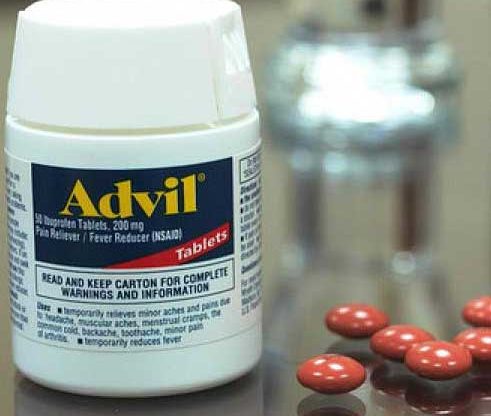The common cold and the flu are making their first rounds of the season, and the rattling of bottles of Advil and other over-the-counter medications are what often rise up to meet them. Over 17 million Americans use drugs like Advil or other nonsteroidal anti-inflammatory drugs (NSAIDs) on a daily basis, often to treat symptoms of illness or pain such as fever, headache or joint stiffness. Occasional use following the dosage indicated on the bottle, or use as directed by a doctor, can be very beneficial in relieving some symptoms. However, we should be wary of the rate at which we are taking these drugs. Taking Advil or other NSAIDs often pose health risks of their own, and many people, including the perpetually-ill average college student, do not consider or are not aware of these risks before swallowing these little pills every four to six hours.
Proper dosage depends on multiple factors, such as age and what the medicine is being used for, and this outlined on the packaging of the medication or can be suggested by a doctor. Even so, using NSAIDs often can lead to a variety of gastrointestinal, renal and cardiovascular health problems. Frequent use of NSAIDs like Advil can cause bleeding in the stomach or intestines, which can occur without warning signs. Kidney damage and even renal failure can also result from NSAIDs, and the National Kidney Foundation suggests that while occasional use as directed is generally safe, these drugs can adversely impact kidney function. These drugs can also raise blood pressure and affect the heart. For those who have used these drugs long-term or who already have a heart disease, chance of heart attack increases with use of these common drugs. Risk is often higher for people who are dehydrated, and being a smoker or a regular consumer of alcohol raises this risk.
This information should ring some major alarm bells for college students. Many students are already not in good health by the middle of the term—lack of exercise and sleep, poor diet, dehydration and frequent colds are commonly encountered problems. Research from the University of Tampa suggests that college students appear to be using over-the-counter medication at higher rates than the general public. Since students are stressed and often remain sick for a long time or get sick frequently, sustained use of medications like NSAIDs for these symptoms is likely, and it is this sustained use that increases risk of health complications.
Taking Advil or other over-the-counter medications will usually be safe, especially if they are only taken every so often, but they should certainly be used sparingly. Even if the bottle recommends a dose every four to six hours, it is best to use over-the-counter medication only when it is necessary. Students should also be conscious of alcohol consumption when using anti-inflammatory drugs since regular drinking or even dehydration after a night of heavy drinking can increase chances of the above-mentioned problems. These risks can seem less serious when fellow classmates are taking over-the-counter medication for every mild cold or pain, but trying to avoid NSAID use, or paying attention to proper dosage when they are needed, is something many more students should practice.











